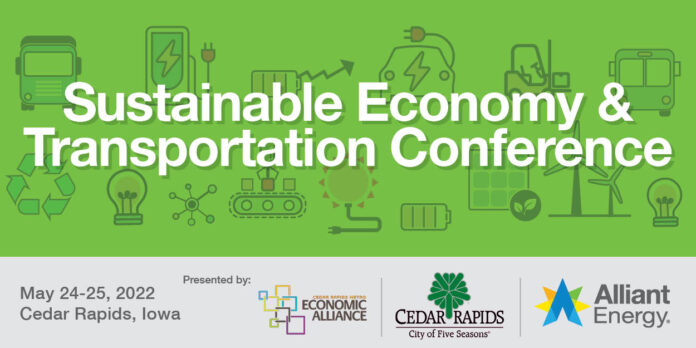
Suzanne Sobotka, policy and research director for a nonprofit advocating for sustainability in transportation called Move Minnesota, will champion strategies to reduce vehicle miles traveled in Cedar Rapids during her keynote address on May 24.
Hosted by Alliant Energy, the City of Cedar Rapids and the Cedar Rapids Metro Economic Alliance, Ms. Sobotka headlines day one of a jam-packed Sustainable Economy & Transportation Conference at the Cedar Rapids Public Library.
Vehicle miles traveled is a measurement used in transportation planning meant to calculate the amount of travel for all vehicles in a geographic region, according to the Texas A&M Transportation Institute.
Reducing vehicle miles not only greatly benefits the environment by reducing greenhouse gas emissions, but modifying a transportation system can improve many aspects of an individual’s life they wouldn’t automatically consider, said Ms. Sobotka.
“I find that equity arguments in favor of vehicle miles traveled reduction are a lot more compelling and they tend to bring together folks who wouldn’t normally work together,” she said. “In terms of housing, at least in Minnesota, we saw a big influx in housing dollars coming here, which is great. But we started to hear from housing advocates that we would get people in stable housing situations, and then they wouldn’t be able to get to work or school because there was no reliable transit service or safe bike path. You begin to see all these intersections and how physical mobility and access translates to social mobility and access.”
Her keynote address on May 24 will hit upon the four pillars she views, based on her sustainability experience in Minnesota, as most important to reducing vehicle miles: land use and parking requirements, a robust transit infrastructure, encouraging behavior change and policy advocacy.
“One thing we do is try to show the return on investment for people,” she said. “Car ownership is frequently the second highest housing expense. If you have good transit options, that means you don’t need a vehicle to get around. It’s really, in my mind, a huge saving.”
“We get a lot of support from economic development and labor groups because labor unions build these transit routes,” she added.
The conference is meant to reinforce the major components of the Cedar Rapids Community Climate Action Plan including the idea that all city residents should be able to address their basic needs through a 15-minute walk or other low-emission activity.
“I really like the direction they’re going with it,” she said of the plan.
Day two of the sustainability conference will feature keynote speaker Keith Taylor, assistant specialist in CE and community economic development for the University of California.




